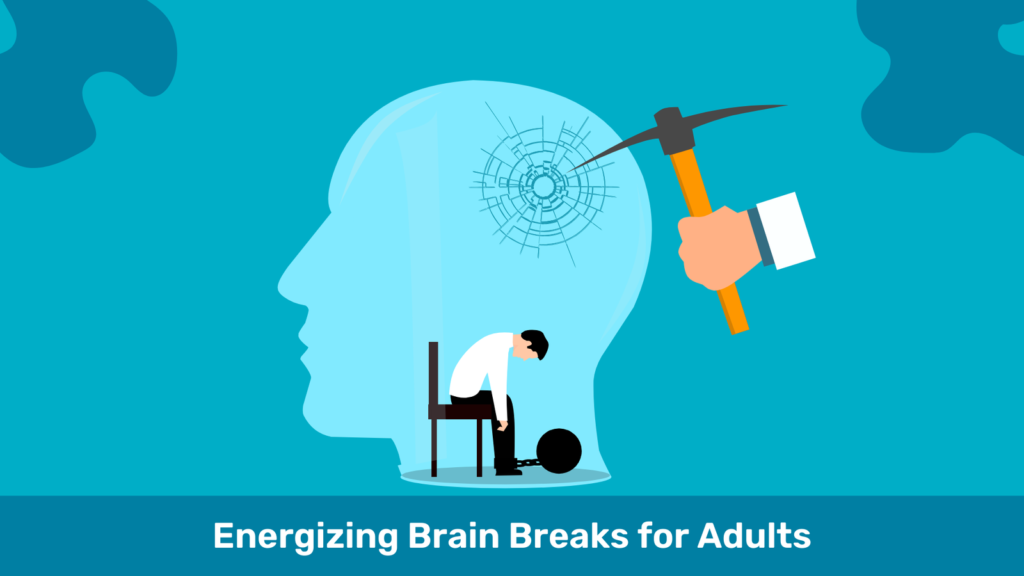Introduction
Brain breaks for adults at work are short, intentional pauses designed to give the mind a chance to rest and reset. These breaks might involve stretching, deep breathing, quick walks, or simply stepping away from the screen for a few minutes.
By regularly integrating brain breaks into the workday, adults can reduce mental fatigue, improve focus, enhance creativity, and promote overall well-being. But if you’re struggling to come up with a comprehensive list of brain break ideas for adults, don’t worry – we’ve got you covered. In this article, we’ll explore the benefits of brain breaks and share practical tips for making them a regular part of your work routine.
Top 8 Brain Break Activities For Adults
1. Go for a Walk

Ah, yes, the good old walk. This might not seem like a productivity supercharger, but simply moving around and getting your blood circulating does wonders for your concentration, not to mention helping you manage your weight and reduce your risk of chronic disease.
Studies with fMRI machines reveal that taking a 30 minute walk boots brain activity in areas of the brain responsible for focus and attention. Another study found that power walking, whether outside or on the treadmill, was able to boost creative-thinking skills by some 60 percent compared to sitting.
Having a tough day? Walking can also boost your mood. Many studies indicate that walking for 35 minutes five days per week can lift your mood and reduce mild to moderate depressive symptoms.
Don’t have time for a half-hour walk? Even a short ten-minute bout of exercise can do wonders for your concentration. In one study, just 10 minutes of laid-back spinning on an exercise bike greatly improved memory function and recall. Now that’s a brain break idea for adults we can get behind!
Walking outside is best, but if you are truly crunched for time, simply marching around the house can elevate your heart rate. As you march, try to mix in high-steps, skipping, and jogging.
Also Read: Creating a successful office step challenge
2. Try Yoga Poses

The development of Yoga can be traced back at least 5,000 years to Ancient India. In the recent decades, yoga has become hugely popular in the Western world, and for good reason: It’s incredibly effective at relaxing your body and clearing the mind.
In fact, researchers at the University of Illinois found that just eight weeks of regular yoga could improve cognitive function among those with a sedentary lifestyle, meaning you don’t have to be a seasoned yoga master to reap the benefits.
The same study also found that participants who completed a 20-minute yoga session “showed noteworthy improvement in memory, speed, and accuracy.” In a similar study, the University of Waterloo found that just 10 minutes of yoga allows you to “better focus on purposeful tasks” while reducing stress levels.
3. Doodle

This one isn’t just for bored kids at school. As Inc. reported, “Research in neuroscience, psychology and design has recently demonstrated that people who doodle are often better at grasping new concepts and staying focused, using the page and the pen as a means of refining creative ideas.”
As The Lancet explained, scribbling engages “default networks” in the brain that typically lie dormant unless stimulated externally, such as with a pencil and paper.
Amazingly, one study found that “Individuals who kept their brain active through doodling while listening to lists were able to recall the lists 29% better than participants who did not.”
As to what you should doodle—it doesn’t matter. Whether it’s your dog, your cat, your spouse, your coworkers, get those creative juices flowing by scribbling.
4. Work Standing Up

This might be the ultimate brain break activity for adults. In recent years, doctors have been calling sitting “the new smoking.” Indeed, the longer you sit, the harder your heart works to circulate blood, which can lead to obesity and high blood pressure over time. It also turns out that sitting isn’t very good for our concentration either.
As part of an experiment for New York magazine, journalist Dan Kois spent an entire month exclusively on his feet while working. The result? Not only did he lose five pounds, but he cut down “drastically” on his time-wasting while getting more writing done than in any month he could remember.
Read Further: Why Proper Ergonomics In The Workplace Is Important
5. Breathe Deep

Here’s one brain break idea for adults that you can do without even leaving your desk! Box breathing, also called square breathing, is a technique using slow, deep breaths to improve concentration. It’s devotees include professional athletes to Zen masters to U.S. Navy Seals.
According to the Mayo Clinic, box breathing can calm and regulate your autonomic nervous system, which regulates body functions like temperature and blood pressure.
To get started, sit upright in your chair with your feet flat on the ground. Try to minimize any distractions so you can focus solely on breathing. Keeping your hands relaxed in your lap with your palms facing up, focus on sitting completely upright.
-
- Step 1: Slowly exhale through your mouth, expelling all oxygen from your lungs. Imagine every last air molecule leaving your body.
- Step 2: Slowly inhale through your nose to the count of 4. Feel the air filling your lungs, expanding them outward against your ribcage like a balloon.
- Step 3: Hold your breath for another slow count of 4.
- Step 4: Exhale once again for 4 slow seconds, feeling your lungs gradually deflate as they expel all air from your body.
- Step 5: Repeat the above steps.
6. Stretch it Out

When you sit for too long, you’re likely to develop minor aches and pains that sap your concentration. If you’re hunched over on your keyboard, your back, shoulders, elbows, and wrists can get sore.
Why not take a few minutes to stand up and try a few deep stretches to relieve tension. Check out the Woliba fitness library for our series on stretches you can perform right at your desk.
7. Drink Water

Did you know that some 75 percent of Americans suffer from chronic dehydration? Over time, dehydration can lead to many complications, including fatigue, joint pain, headaches, ulcers, and high blood pressure.
For the sake of not just your productivity levels, but your overall health, be sure to drink the recommended amount of water each day—approximately 15.5 cups for men and 11.5 cups for women, according to the National Academies of Science, Engineering, and Medicine.
In one study by the University of East London and the University of Westminster, researchers found that drinking just 300ml of water could boost attention by a whopping 25 percent!
Read Further: 30-Day Water Challenge: Hydration for a Healthier You!
8. Laugh!

All work and no play makes Jack a dull boy, as the old saying goes. Back when we were regularly in the office, the sound of laughter was as common as clattering keyboards and ringing phones.
Working from home, on the other hand, can be, well, dull. When you’re not surrounded by dozens of coworkers, you have to work a bit harder to lighten the mood.
Studies show that laughter can reduce levels of stress hormones circulating in your body. A good hearty laugh is actually a great workout: Did you know that laughing 100 times in a day is equal to 10 minutes on the rowing machine or 15 minutes on the exercise bike?
By lowering your blood pressure and oxygenating your blood, a healthy bout of laughter might be just what the doctor ordered to keep your body loose. Whether it’s a quick YouTube video or a Zoom call with friends during your lunch break, it’s never a bad time to try a virtual brain break.
Virtual Brain Breaks for Adults
What are virtual brain breaks? In an increasingly remote and hybrid work environment, virtual brain breaks for adults have become an essential tool for maintaining focus, reducing stress, and preventing burnout. These short, intentional pauses are designed to give employees a mental reset, even when working from home or in virtual settings. Virtual brain breaks can take many forms, including guided meditation sessions, quick team trivia games, virtual stretching or yoga classes, or even casual coffee chats over video calls. The key is to step away—mentally and physically—from work-related tasks, allowing the brain to recharge. Organizations can schedule these breaks into team calendars or provide access to virtual wellness platforms to encourage participation. By embracing virtual brain breaks for adults, companies can foster a healthier remote work culture, boost productivity, and create stronger connections among distributed teams.
Benefits of Brain Breaks for Adults
- Improved productivity
- Reduced stress and anxiety
- Increased creativity
- Improved mood
- Better physical health
- Enhanced learning
- Increased motivation
Why Adults need Brain Breaks
Adults need brain break activities to enhance their mental well-being, productivity, and overall cognitive functioning. Taking short breaks throughout the day allows the brain to rest, recharge, and refocus, leading to improved cognitive performance and reduced mental fatigue. Here are some key reasons why adults need brain breaks:
-
Enhanced productivity:
Continuous focus on tasks without breaks can lead to diminishing returns. Taking regular brain breaks helps prevent mental burnout and allows individuals to return to tasks with renewed focus and energy. It improves productivity, concentration, and attention span, leading to more efficient and effective work.
-
Stress reduction:
Extended periods of intense mental activity can increase stress levels. Brain breaks provide an opportunity to relax, destress, and engage in activities that promote well-being, such as stretching, deep breathing, or engaging in hobbies. These breaks help alleviate stress, improve mood, and contribute to a healthier work environment.
-
Improved creativity and problem-solving:
Stepping away from work for short intervals allows the mind to process information subconsciously. This can enhance creativity, problem-solving abilities, and innovative thinking. Brain breaks provide a chance for new ideas and insights to emerge, leading to fresh perspectives and improved decision-making.
-
Enhanced memory and learning:
Research shows that taking regular breaks during learning or complex tasks improves memory consolidation. It allows the brain to encode and store information more effectively, leading to better retention and recall. Brain breaks can be particularly beneficial when engaged in activities that promote relaxation, such as taking a walk or practicing mindfulness.
-
Physical well-being:
Brain breaks for adults at work often involve physical movement or exercise, which has numerous benefits for overall health and well-being. Physical activity stimulates blood flow to the brain, improves oxygenation, and releases endorphins, leading to increased energy levels, improved mood, and better overall cognitive function.
-
Maintaining work-life balance:
Incorporating brain break activities for adults into daily routines helps individuals achieve a better work-life balance. It allows for personal time, self-care, and engagement in non-work-related activities, fostering a more holistic approach to well-being. Brain breaks can help individuals avoid overworking, prevent burnout, and prioritize their mental and emotional health.
Conclusion
Taking regular brain breaks is an effective way for adults to improve their overall well-being and productivity.
How many quick or virtual brain breaks can you fit into your work day?
In a time when millions of people are working from home, it’s critical to give yourself numerous energizing brain breaks. Remember, your brain needs to be exercised just like any other organ, and it also needs to rest. Fortunately, a few fun brain break ideas for adults are all it takes to keep you focused on your goals while avoiding burnout.
Let us help you create a fun and impactful workplace challenge experience for your team. Contact Woliba today!











